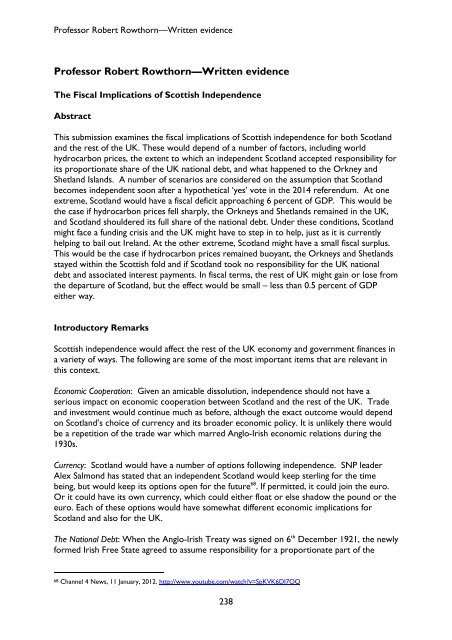SELECT COMMITTEE ON ECONOMIC AFFAIRS - Parliament
SELECT COMMITTEE ON ECONOMIC AFFAIRS - Parliament
SELECT COMMITTEE ON ECONOMIC AFFAIRS - Parliament
You also want an ePaper? Increase the reach of your titles
YUMPU automatically turns print PDFs into web optimized ePapers that Google loves.
Professor Robert Rowthorn—Written evidence<br />
Professor Robert Rowthorn—Written evidence<br />
The Fiscal Implications of Scottish Independence<br />
Abstract<br />
This submission examines the fiscal implications of Scottish independence for both Scotland<br />
and the rest of the UK. These would depend of a number of factors, including world<br />
hydrocarbon prices, the extent to which an independent Scotland accepted responsibility for<br />
its proportionate share of the UK national debt, and what happened to the Orkney and<br />
Shetland Islands. A number of scenarios are considered on the assumption that Scotland<br />
becomes independent soon after a hypothetical ‘yes’ vote in the 2014 referendum. At one<br />
extreme, Scotland would have a fiscal deficit approaching 6 percent of GDP. This would be<br />
the case if hydrocarbon prices fell sharply, the Orkneys and Shetlands remained in the UK,<br />
and Scotland shouldered its full share of the national debt. Under these conditions, Scotland<br />
might face a funding crisis and the UK might have to step in to help, just as it is currently<br />
helping to bail out Ireland. At the other extreme, Scotland might have a small fiscal surplus.<br />
This would be the case if hydrocarbon prices remained buoyant, the Orkneys and Shetlands<br />
stayed within the Scottish fold and if Scotland took no responsibility for the UK national<br />
debt and associated interest payments. In fiscal terms, the rest of UK might gain or lose from<br />
the departure of Scotland, but the effect would be small – less than 0.5 percent of GDP<br />
either way.<br />
Introductory Remarks<br />
Scottish independence would affect the rest of the UK economy and government finances in<br />
a variety of ways. The following are some of the most important items that are relevant in<br />
this context.<br />
Economic Cooperation: Given an amicable dissolution, independence should not have a<br />
serious impact on economic cooperation between Scotland and the rest of the UK. Trade<br />
and investment would continue much as before, although the exact outcome would depend<br />
on Scotland’s choice of currency and its broader economic policy. It is unlikely there would<br />
be a repetition of the trade war which marred Anglo-Irish economic relations during the<br />
1930s.<br />
Currency: Scotland would have a number of options following independence. SNP leader<br />
Alex Salmond has stated that an independent Scotland would keep sterling for the time<br />
being, but would keep its options open for the future 68 . If permitted, it could join the euro.<br />
Or it could have its own currency, which could either float or else shadow the pound or the<br />
euro. Each of these options would have somewhat different economic implications for<br />
Scotland and also for the UK.<br />
The National Debt: When the Anglo-Irish Treaty was signed on 6 th December 1921, the newly<br />
formed Irish Free State agreed to assume responsibility for a proportionate part of the<br />
68 Channel 4 News, 11 January, 2012. http://www.youtube.com/watch?v=SpKVK6DI7OQ<br />
238

















